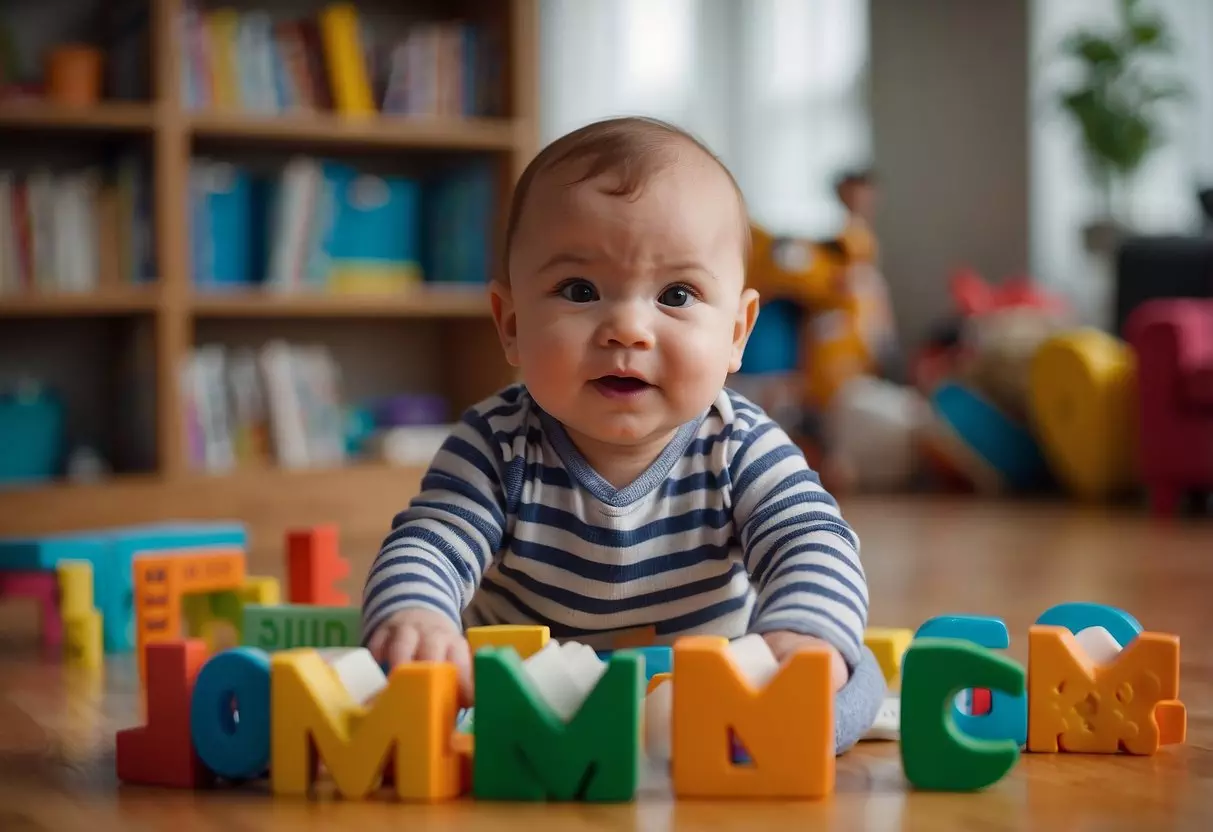Can an 8 Month Old Say Words? Early Speech Milestones and Tips
Are you wondering if your 8-month-old can start saying words? At 8 months, babies often begin to babble and may say simple sounds like “mama” or “dada.” These sounds are usually not linked to the actual meaning yet, but they are an essential part of language skills development.

Babbling is a significant milestone for language skills. Your baby is experimenting with different sounds, which is an important step toward forming actual words. They may also try to imitate the noises they hear from you and other adults around them.
If you notice your baby imitating gestures and pointing at objects while babbling, these are good signs of their growing communication skills. To find out more about the developmental stages and what to expect, you can refer to detailed guidelines on age-appropriate speech and language milestones.
Table of Contents
Early Language Development

In the first year of life, babies go through several stages of language development. These stages include making different sounds and starting to say simple words.
The Timeline of Babbling and Speech Sounds
Babies begin cooing and gurgling as early as 3 months. These sounds are their first attempts to use their vocal cords. By the time they reach 6 months, their sounds diversify into babbling. Babbling includes repeated syllables like “ba-ba” or “da-da”, which don’t yet hold specific meanings but are important pre-speech practice.
At around 8 months, babies may imitate the intonation of adult speech. This means their babbles might sound like actual conversation patterns. They’t start to mimic sounds they hear often. By 12 months, many babies start to say their first intentional words.
Recognizing Common First Words and Sounds
By the end of 6 months, babies might begin to recognize familiar voices and sounds. For example, they may turn their head toward the sound of their parent’s voice. Around 8 months, they might respond to their own name or simple requests.
Common first words for babies around 12 months include “mama” and “dada”. These words are often used to name their parents. Babies might also make animal sounds like “moo” or “baa” and use simple words to ask for things they want, like “milk” or “cookie”.
Encouraging your baby to make sounds and babble helps them practice their speech muscles. Talking to your baby frequently and naming objects around the house can support their language growth. For example, you can say “ball” when showing them a ball or “car” when pointing to vehicles. This helps them connect words with their meanings.
Understanding and Encouraging Speech

By 8 months, your baby may start responding to their name and babbling. Through gestures and everyday interactions, you can help boost their speech and language skills.
The Role of Gestures and Non-Verbal Communication
Gestures like pointing and waving are key in early communication. When your baby uses these gestures, they are trying to convey their needs and feelings. Pay attention to these actions as they can signal what your baby is thinking.
Encouraging your baby to use gestures helps build their vocabulary. For example, if your baby points to a toy, say the toy’s name out loud. This helps them connect words with objects. Gestures are stepping stones to speaking simple words like “mama” and “dada.”
By responding to your baby’s gestures, you’re showing that you understand them. This builds their confidence and encourages them to keep trying to communicate through both actions and eventually words.
Fostering Communication through Daily Activities
Daily interactions are perfect opportunities to encourage speech development. Talk to your baby during routine activities like feeding or dressing. Describe what you are doing and name objects around you. This helps them learn new words and understand context.
Reading to your baby is another great way to enhance their language skills. Choose books with colorful pictures and simple words. Point to pictures and name them, encouraging your baby to repeat the words.
Singing songs and nursery rhymes also helps. Babies love rhythm and repetition, which make learning new words fun. Encourage your baby to clap or make sounds along with you to keep them engaged.
When your baby babbles, listen and respond. This two-way conversation, even if it’s not yet real words, teaches them the give and take of communication.
Identifying and Addressing Speech Delays

Early detection and intervention are key to helping children with speech delays. Knowing when to consult a pediatrician or speech-language pathologist can make a significant difference in your child’s speech and language development.
When to Consult a Pediatrician or Speech-Language Pathologist
Keep an eye out for certain milestones in your child’s language development. By around 18 months, your child should have a growing vocabulary and begin combining words. If you notice limited vocabulary, lack of babbling, or difficulty combining words by this age, it’s worth consulting a pediatrician.
A speech-language pathologist can perform a detailed evaluation and suggest appropriate treatments. If your child isn’t responding to verbal cues or displays limited social interaction, these could be signs of a speech or hearing loss issue. Early intervention can help address these delays effectively.
If your child doesn’t say basic words like “mama” or “dada” or doesn’t use gestures such as pointing or waving, it’s important to seek professional advice. Timely assessment by a professional is crucial to supporting your child’s speech and language milestones.
For more information, you can refer to resources such as warning signs of a speech delay in toddlers or speech-language milestones.
Maximizing Interaction and Learning

Engaging with your baby through reading, music, and interactive play is crucial in developing their language skills. These activities create an enriching environment that promotes effective learning and communication.
The Impact of Reading and Storytelling
Reading stories to your child is one of the best ways to boost language development. When you read to your baby, you introduce them to new words and sounds. Books with colorful pictures and simple stories are most engaging for young children.
Storytelling enhances listening skills and helps babies learn the rhythm and tone of your voice. Repeating familiar stories can help your child recognize and eventually use new words. Asking simple questions about the story can also encourage interaction and engagement.
Incorporating Music and Play in Language Acquisition
Music and play are powerful tools in language learning. Singing songs with repetitive and simple lyrics helps babies grasp new words. Nursery rhymes and action songs that involve clapping or movement are especially effective.
Incorporating musical instruments or toys during playtime can add an extra layer of engagement. Playing games like peek-a-boo or pat-a-cake encourages your child to respond with sounds or actions, laying the foundation for future speech. By combining music and play, you create a fun and stimulating learning environment.
For more information, you can visit HealthyChildren.org, Huckleberry, and KidsHealth.
